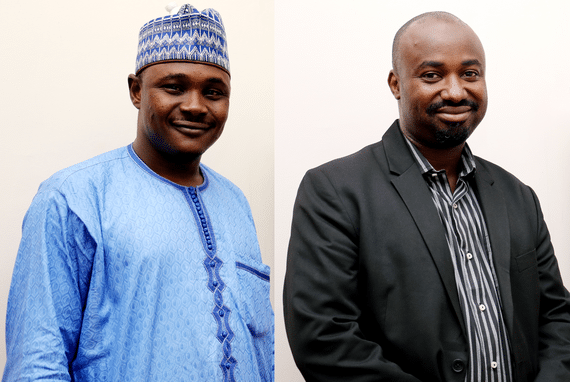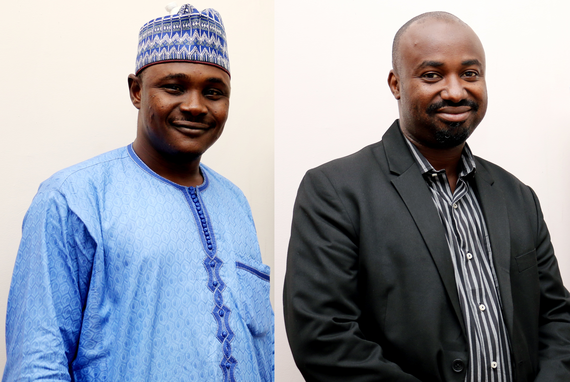A discussion with Abdulrazaq Alkali and Abdullahi Yakubu of Youth Society for the Prevention of Infectious Diseases & Social Vices, an NGO which promotes the social well-being of young people, including women of reproductive age.
Champions for Change (C4C) is pleased to continue our ‘Meet the Champions’ Series. This blog series highlights the work of 24 Nigerian leaders currently participating as C4C champions. C4C’s Champions in Nigeria are working together to save the lives of mothers, children and young women through innovative advocacy and leadership development. Nigeria is Africa’s largest economy, and yet tens of thousands of women and children die there each year due to lack of maternity care, preventable disease and poor health infrastructure, among other causes. This series brings a diversity of perspectives from around Nigeria to the table to discuss this critical moment in Nigeria’s history and how Nigerians can work together to build a healthy future for all.
The series continues with an interactive discussion with Abdulrazaq Alkali and Abdullahi Yakubu of Youth Society for the Prevention of Infectious Diseases & Social Vices (YOSPIS), a non-governmental organization which promotes the social well-being of young people, including women of reproductive age, through empowerment campaigns and direct service delivery. The organization is based in Kano and implements activities in northern Nigeria.
C4C: Tell us a little bit about yourself…
Alkali: I was born and raised in a neighborhood called Kurawa, at the center the ancient city of Kano. I belong to a polygamous family; both my father and mother were from noble Fulani families. I attended Kurawa primary, junior secondary and senior secondary school all in Kano city, and was admitted into Kano State Polytechnic and graduated with a National Diploma in Banking and Finance in 2001. In 2002 I went to Bayero University Kano and graduated with a BSc in Accounting in 2007. I am now pursuing my Master’s Degree in Guidance and Counseling from the same university.
Abdullahi: I am the third of five boys child in my family and son to a working class mother who happens to be a Midwife, and I was born in Kano State. I attended Bayero University Kano and graduated with a BSc in Education Geography in 2004. AS the Senior Program Officer for my organization I oversee the day-to-day implementation of our project interventions and prepare reports.
C4C: What led to your involvement in RMNCH work? What is the one issue you are most passionate about in the field of RMNCH?
Abdullahi: I was opportune to be trained by YOSPIS as a peer educator on RMNCH and HIV/AIDS during my university days, where we engaged our friends in discussions around those issues to create awareness. After I graduated, I served as a volunteer at the same organization which exposed me more to the realities and challenges faced by women and children due to poor infrastructure and lack of service delivery. This informs my concern about RMNCH in Nigeria.
Alkali: My first involvement in RMNCH work was in 2003, when YOSPIS implemented a reproductive health and family planning project for young people in seven communities in Kano. I didn’t have any health work background, but I always made sure all relevant data and information were collected from the target facilities and other outreach canters for onward transmission to the donors. Along the way, I came to realize that there are growing numbers of women and men in dire need of family planning services. I believe this work can shape a lot of families and society and help young women to grow. I am of the opinion that women’s right to healthcare is the most basic and fundamental of human rights and my goal is to become an advocate and a programmer so that I can work to make sure no one is denied access to the healthcare they need.
C4C: Why did you opt to be part of the PHI/C4C program? What skills do you hope to acquire and what do you intend to do with these new knowledge and skills?
Alkali: I decided to join C4C so that I can learn to be a better leader in my civil society work and to deepen my knowledge and understanding of effective advocacy. I am optimistic that C4C program is providing me with opportunity to grow professionally and be able to pursue noble ways to give the average person (young women and youth) a voice within the public space. I will use the new knowledge and skills learned to strengthen the capacity of my core team and take lead as proponent of our RMNCH work and other areas of development at my organization.
Abdullahi: I wanted to be part of C4C as a new intervention in order to gain knowledge and experience, build new networks, and learn more on how to be a champion on RMNCH. I’ve enjoyed improving my skills in strategic advocacy to engage relevant stakeholders and make a difference in the area of RMNCH in Nigeria.
C4C: What is the biggest challenge you face in your work?
Abdullahi: Attitudinal change especially when it comes to religious misinterpretation and traditional perception of the issues you are advocating for.
C4C: What success are you most proud of in your professional career?
Alkali: One of the successes I am always proud of in RMNCH work is supporting child spacing services in hard to reach communities through a network of community health extension workers, despite socio-cultural barriers. I made many women of reproductive age happy and healthy through this initiative.
Abdullahi: I am most proud to be one of the chosen candidates for the C4C project, as only 24 people were selected from the hundreds of applicants who applied.
C4C: Why is advocacy for RMNCH important in communities/states and Nigeria?
Alkali: RMNCH advocacy is very important at all levels of government and communities in Nigeria, because mothers and children are still dying as a result of preventable causes. We need to advocate for changes in policies, increased resource allocation to the health sector, and stoppage of harmful practices that kill, injure and violate the rights of women and children.
Abdullahi: Women for too long have been disadvantaged in most of the communities in Nigeria as a result of religious misinterpretation and harmful traditional practices. It is therefore very important to advocate for change when it comes to RMNCH since records have shown that a high number of women and children lose their life from preventable diseases and poor service delivery.
C4C: What is your vision for the future of Nigeria Health System? What would be different if women, newborns, and children had adequate access to good quality health services and information?
Abdullahi: I want to see a Nigeria where the health system is working properly, with adequate access to good health services and information to all.
Alkali: I would like to see Nigeria’s health system reformed and committed to providing the best healthcare possible where women and children health are at the center of everything.
C4C: What is your favorite thing to do when you want to relax and have fun?
Alkali: I enjoy watching movies.
Abdullahi: I enjoy playing with my lovely kids and watching the news.
C4C: Please complete this statement: I am champion for change because…
Alkali: Women and children are the best part of me.
Abdullahi: Health is Wealth.
C4C: The most fun thing I’ve done in the last year is…
Abdullahi: The graduation ceremony for the first C4C training in Lagos.
Alkali: Try to engage in constructive argument about Nigeria’s politics with a lunatic!
C4C: My favorite memory from my work is…
Alkali: Being part of the Reagan-Fascell Democracy fellowship in Washington D.C. 2013.
Abdullahi: Emerging as one the winners of Nigeria Youth Talent Hunt Exhibition & Top-12 Awards 2011 by Federal Ministry of Youth Development in collaboration with Youngstars Foundation & British Council-Nigeria.
C4C: My favorite song is…
Abdullahi: “Dear Mama” by Tupac Shakur
Alkali: “Someone like You” by Adele
C4C: When I think about my childhood, I feel…
Alkali: Lucky, honored and thankful.
Abdullahi: Happy and appreciate my parents.
We invite you to follow us on Twitter at @C4C_Champions and use the hashtag #MeetTheChampions to engage more closely with the blog series, the work of the 24 leaders whose work is being highlighted, and the larger conversation surrounding reproductive, maternal, newborn and child health in Nigeria.
Champions for Change saves the lives of women and children in Nigeria by empowering local leaders and organizations to improve reproductive, maternal, newborn and child health through advocacy, education, storytelling and strategic partnerships. Champions for Change leverages a program model developed by its sister initiative, Let Girls Lead, which has contributed to improved health, education and livelihoods for more than 3 million girls globally since 2009. This powerful model drives change through the passage of national laws, implementation of programs and distribution of funds to ensure access to quality healthcare, education and economic opportunity.
Champions for Change and Let Girls Lead are headquartered at the Public Health Institute in Oakland, CA, a leader in global health and development for 50 years.



